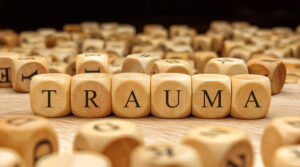Human beings are usually able to regulate their level of distress and return to a state of equilibrium after facing a stressful event. However, if we face an extremely stressful event that leaves us feeling helpless and out of control, and we find it very difficult to get back to a normal state, then we may have experienced trauma. In this case, the intensity of the stressful situation deregulates our nervous system, causing long-term physical and emotional damage.
When we speak about trauma, we usually associate the word with war, accidents, serious physical illnesses, death and abuse, all of which can lead to post-traumatic stress disorder. However, a traumatic experience can be much subtler than these major events and can be caused by seemingly unimportant events in infancy and childhood. These events, although they appear to be trivial, can create prolonged stress in babies and children leading to long-term mental and physical illnesses, including anxiety, depression, relationship problems and chronic physical illnesses. When trauma is not resolved in childhood, the state of trauma remains permanently, creating a sense of fear and helplessness that continues throughout adulthood.
A traumatized person becomes stressed more easily than a healthy person. He/she:
always looks for danger and is always on guard
avoids conflicts and confrontations
is always in survival mode
suppresses his/her desires and does not set high goals for her/himself
avoids feelings as much as he/she can
What causes childhood trauma?
Anything that disrupts the child’s sense of safety can cause childhood trauma. The relationship a child has with his or her parents is very important to emotional development. When children experience inadequate parenting, the relationship they have with their primary caregiver may suffer and this can cause trauma. A child is vulnerable and needs proper care. When his or her relationship with the primary caretaker fails, either because of unintentional neglect stemming from post-partum depression, mental illness, trauma or grief, or emotional or physical abuse, the child’s sense of security is threatened and he or she fails to develop the ability to calm and soothe himself or herself in times of distress. This is traumatizing for the child and makes him or her more at risk of traumatic experiences as an adult. Separation from the caretaker, as in the case of divorce or the death of a parent, also has a very significant effect on the child’s emotional and relational development. Children find it very difficult to deal with a sense of loss. Many children find ways to distract themselves from experiencing the sadness of losing their caregivers; however, this sense of loss does not disappear and comes back even more forcefully in the future, causing extreme anxiety, depression, guilt, etc.
What are the physical and emotional symptoms of trauma?
Usually symptoms of trauma take some time to show their effects. The stronger the trauma, the more the child will physically and emotionally suffer as an adult.
Physical symptoms can include:
chronic physical pains such as bowel problems, chronic fatigue, muscle tension, etc.
eating disorders
insomnia
poor concentration
sexual difficulties
Emotional effects of trauma can include:
depression
anxiety and panic attacks
emotional swings
Obsessive-Compulsive Disorder
feeling out of control
hopelessness and despair
fearfulness
extreme guilt and self-blame
shame
rage and anger
difficulty establishing or maintaining relationships
How can therapy help with trauma?
Experiencing trauma in childhood results in having painful feelings, urges and thoughts that we try to push out of our awareness in order to cope and continue living. However, suppression of these feelings and thoughts does not stop them from influencing our behaviour in the future.
Sarah’s parents got divorced and her father left, and her mother also became depressed and unavailable to Sarah. This was traumatic to Sarah. Sheneeded both parents, and because she was little, she was not able to process what was emotionally going on for her. Instead, she distracted herself and tried to keep strong. Now Sarah is grown up and finds herself not able to form a relationship, but she is not able to understand why. When her therapist digs deeper, they realize that she is trying to avoid some potential difficult feelings, like disappointment, rejection, abandonment, distrust, rage and anger that a relationship can bring up. Of course, these feelings are not new, and Sarah already experienced all these emotions as a child but pushed them down the unconscious. Now as an adult being in a relationship means that she might experience those difficult emotions related to her prior trauma. In this way, her fear stops her from being able to live her life fully.
The therapist focuses on our early childhood experiences, our relationships with our parents and the way they related to us and our current relationships. The therapist will also focus on what defences we use to protect ourselves from the difficult feelings and thoughts resulting from traumatic experiences. These defences were useful once, but now are causing us more pain. In order to change our behaviour, we need to get in touch with those difficult emotions and thoughts, with the help of the therapist. This change will be brought about by recognizing the defences that we use to suppress our feelings. By feeling those emotions and by becoming aware of our defences, the therapist will help us to free us from the feeling of being stuck or helpless, and from other difficulties stemming from trauma.
Please feel free to Contact me if you wish to have a brief chat or to book an appointment.



